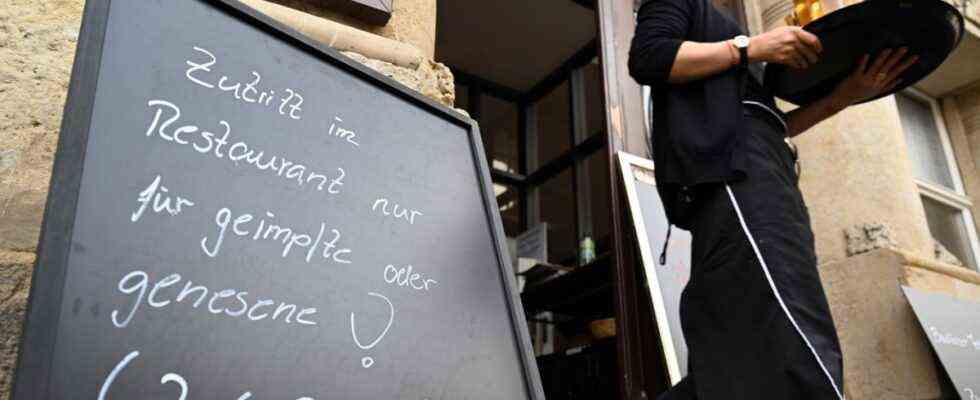Whether traveling or dining: those who have recovered from corona currently enjoy the same freedom as those who have been completely vaccinated – but only up to six months after the proven infection. Then it’s time to get tested or vaccinated. Is this time limit really useful and necessary? No, says Sebastian Ulbert, Head of the Vaccines and Infection Models Department at the Fraunhofer Institute for Cell Therapy and Immunology in Leipzig. “This six-month rule now lacks a scientific basis.”
How was the six-month deadline set at all? The data available at the time would have proven protection for about eight months, explains Thomas Mertens, chairman of the Standing Vaccination Commission (Stiko). The six months would provide a two-month safety margin.
“The six months were an estimate, today you could extend the period”
For Ulbert, the six months are now set too short. With Sars-CoV-2, there is now enough data showing that those who have recovered are often still well protected a year after infection, even against virus variants such as Delta. In the case of vaccinated people, this cannot yet be said because the studies have not yet run long enough. However, many vaccines generally achieved “at best the immunity of a previous infection,” says Ulbert.
Carsten Watzl, Secretary General of the German Society for Immunology (DGfI), says that protection for those who have recovered does not decrease as much over time as for those who have been vaccinated. Watzl therefore thinks about the status of the approximately four million recovered in Germany: “The six months were an estimate, today the period could be extended.”
The digital vaccination certificate of the fully vaccinated is initially valid for twelve months and is therefore twice as long as the convalescent status. The certificate must then be renewed. It is currently unclear whether this will require a booster vaccination and thus an additional entry in the vaccination card. Those who have recovered currently have to be vaccinated once after six months in order to be considered certified protected again.
An immune response triggered by an infection is “about stimulating a long-term immunological memory,” explains Ulbert. In the case of the new type of corona virus, it was initially assumed that the infection would not leave any effective long-term protection, explains the expert. But that is now out of date. For Ulbert this means in concrete terms: “If those who have recovered are at least as well protected, they cannot – unlike those who have been vaccinated – be treated again after six months as if they had never seen the virus.”
According to Watzl, a previous infection protects against a renewed illness with about 80 percent effectiveness. According to the immunologist, the protection on average is similar to that of vaccinations, but it is probably quite variable. That is, some who have gone through the disease show antibody levels like those who have been vaccinated. But it also happens that those who have recovered have little or no detectable antibodies. Nevertheless, according to Watzl, they could be protected from a severe corona infection by memory cells of the immune system.
Those who have recovered should also be vaccinated. The ideal time for this is still unclear
Because of the unclear protection, from an immunological point of view it is best for those who have recovered to get vaccinated after a certain period of time, advises Watzl. The Stiko is considering extending the recommended time span over the six months, explains Thomas Mertens. Because the infection works like a first dose of vaccine, only one dose is necessary later. “After that you have very good protection,” says Carsten Watzl. Sebastian Ulbert also makes it clear: “I am not against vaccinating convalescents, the timing just needs to be reconsidered.”
There is still no vaccination recommendation for children under the age of twelve for whom no vaccine has yet been approved. For those who have recovered, the same applies to those who have recovered that equality ends after six months for those who have been completely vaccinated. For Watzl, it would be better overall “if we could measure immunity,” he says. But they are not that far yet.
The Robert Koch Institute (RKI) quantifies the period in which antibodies and memory cells of the immune system can be detected in those who have recovered as at least “six to eight months after the onset of symptoms”. The RKI also refers to Recommendations of the Stikoaccording to which the currently available data show a protective effect for at least six to ten months after confirmed symptomatic Sars-CoV-2 infection.
One in the trade journal Nature published work it even comes to the result that Covid-19 patients who were not vaccinated after their illness had a stable reaction of the antibodies to the coronavirus even after up to twelve months. Even after this analysis, those who have recovered and who are also vaccinated enjoy particularly good protection. Your antibodies and memory cells therefore offer a high level of resistance against the virus variants currently in circulation.

